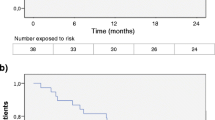Abstract
Background
Fingolimod is an oral daily treatment for relapsing remitting multiple sclerosis (RRMS). A decrease in lymphocytes count is a common side effect, whereby clinicians occasionally propose a reduced dose rather than its discontinuation. However, current data on the effectiveness of these regimens are scarce and contradictory. Our objective was to investigate if the fingolimod effectiveness is maintained with reduction in dosing frequency.
Methods
Retrospective and observational study of RRMS patients taking fingolimod-nondaily (FTY-ND) for at least 6 months. Propensity score–based matching was performed to select patients taking daily dose (FTY-ED) with comparable baseline characteristics: age, sex, disease duration, annualized relapse rate (ARR), and expanded disability status scale (EDSS). Afterwards, clinical and laboratorial assessment was evaluated in both groups.
Results
Thirty-six patients were included in each group (FTY-ED vs. FTY-ND). Decrease in lymphocytes count was the main reason for switching to FTY-ND (88.9%). Previous treatment with natalizumab was inversely associated with risk of reducing dose (OR 0.253, 95%CI = 0.08–0.807, p = 0.016). There were no significant differences in clinical disease activity between patients FTY-ED vs. FTY-ND: mean ARR 0.4 vs. 0.3 (p = 0.247), median EDSS 2.0 vs. 2.0 (p = 0.687), and proportion of patients with EDSS increase 8.3% vs. 13.9% (p = 0.453). FTY-ND was overall well tolerated and was associated with an increase in the mean lymphocytes count (362 ± 103 cells/mm3 to 541 ± 183 cells/mm3, p < 0.001).
Conclusion
These data suggest that the effectiveness of FTY is maintained despite the reduction of the dose, minimizing the most common adverse events. These findings warrant further confirmation, ideally with randomized clinical trials.


Similar content being viewed by others
Data availability
Not applicable.
Abbreviations
- AE:
-
Adverse events
- ALT:
-
Alanine aminotransferase
- ARR:
-
Annualized relapse rate
- AST:
-
Aspartate aminotransferase
- CNS:
-
Central nervous system
- DMT:
-
Disease-modifying therapy
- EDSS:
-
Expanded disability status scale
- FTY:
-
Fingolimod
- FTY-ED:
-
Fingolimod-everyday
- FTY-ND:
-
Fingolimod-nondaily
- MS:
-
Multiple sclerosis
- RRMS:
-
Relapsing remitting multiple sclerosis
- SD:
-
Standard deviation
- ULN:
-
Upper limit of normal
References
Singer B, Ross AP, Tobias K (2011) Oral fingolimod for the treatment of patients with relapsing forms of multiple sclerosis. Int J Clin Pr 65(8):887–895
LM L, Tramacere I, Firwana B, Pacchetti I, Palumbo R, Filippini G (2016) Fingolimod for relapsing-remitting multiple sclerosis. Cochrane Database Syst Rev 4:CD009371
Yamout BI, Zeineddine MM, Sawaya RA, Khoury SJ (2015) Safety and efficacy of reduced fingolimod dosage treatment. J Neuroimmunol 285:13–15
Zecca C, Merlini A, Disanto G, Rodegher M, Panicari L, Anita M et al (2018) Half-dose fingolimod for treating relapsing-remitting multiple sclerosis: observational study. Mult Scler 24(2):167–174
Huwiler A, Zangemeister-wittke U (2018) The sphingosine 1-phosphate receptor modulator fingolimod as a therapeutic agent: recent findings and new perspectives. Pharmacol Ther 185:34–39
Yang T, Tian X, Chen CY, Ma LY, Zhou S, Li M, Wu Y, Zhou Y, Cui YM (2020) The efficacy and safety of fingolimod in patients with relapsing multiple sclerosis: A meta-analysis. Br J Clin Pharmacol 86(4):637–645
Longbrake EE, Kantor D, Pawate S (2018) Effectiveness of alternative dose fingolimod for multiple sclerosis. Neurol Clin Pr 8(2):102–107
Ohtani R, Mori M, Uchida T, Uzawa A, Masuda H, Liu J (2018) Risk factors for fingolimod-induced lymphopenia in multiple sclerosis. Mult Scler J Exp Transl Clin 4(1):2055217318759692
Jeffery DR, Rammohan KW, Hawker K, Fox E, Jeffery DR, Rammohan KW et al (2016) Fingolimod: a review of its mode of action in the context of its efficacy and safety profile in relapsing forms of multiple sclerosis. Expert Rev Neurother 16(1):31–44
Dadalti Y, Spelman T, Boz C, Alroughani R, Lugaresi A, Vucic S et al (2018) Lymphocyte count in peripheral blood is not associated with the level of clinical response to treatment with fingolimod. Mult Scler Relat Disord 19:105–108
Bruschi N, Boffa G, Cellerino M et al (2019) Lymphopenia is not associated with efficacy and risk of adverse events in a real-life MS population treated with fingolimod and dimethyl fumarate. ECTRIMS Online Library. Bruschi N. 09/11/19; 279032; P672
Code availability
Not applicable.
Author information
Authors and Affiliations
Corresponding author
Ethics declarations
Conflict of interest
Joana Ramos-Lopes has nothing to disclose.
Sónia Batista has received grant support from Biogen and speakers’ bureau fees from Biogen, Novartis, Merck, Roche, and Sanofi-Genzyme.
Inês Correia has received speakers’ bureau fees from Biogen, Novartis, Merck, Roche, Teva, and Sanofi-Genzyme.
Carla Nunes, Carmo Macário, and Lívia Sousa have received speakers’ bureau fees from Biogen, Novartis, Merck, Roche, Teva, Bayer, and Sanofi-Genzyme.
Ethical approval
The study was approved by the local Ethics Committee.
Research involving human participants
None.
Informed consent
Informed consent to patients was dispensed by the local Ethics Committee given the retrospective and merely observational nature of the study.
Additional information
Publisher’s note
Springer Nature remains neutral with regard to jurisdictional claims in published maps and institutional affiliations.
Rights and permissions
About this article
Cite this article
Ramos-Lopes, J., Batista, S., Barradas, P. et al. Clinical effectiveness of reduced fingolimod dose in relapsing remitting multiple sclerosis—a Portuguese cohort. Neurol Sci 42, 1039–1043 (2021). https://doi.org/10.1007/s10072-020-04629-6
Received:
Accepted:
Published:
Issue Date:
DOI: https://doi.org/10.1007/s10072-020-04629-6




